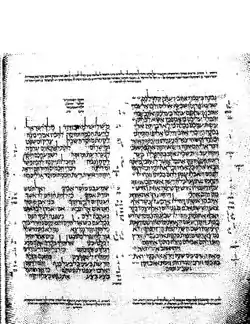Proverbs 25
Proverbs 25 is the 25th chapter of the Book of Proverbs in the Hebrew Bible or the Old Testament of the Christian Bible.[1][2] The book is a compilation of several wisdom literature collections, with the heading in Proverbs 1:1 may be intended to regard Solomon as the traditional author of the whole book, but the dates of the individual collections are difficult to determine, and the book probably obtained its final shape in the post-exilic period.[3] This chapter is the last part of the fifth collection of the book,[4] so-called "the Second Solomonic Collection."[5]
| Proverbs 25 | |
|---|---|
 The whole Book of Proverbs in the Leningrad Codex (1008 C.E.) from an old fascimile edition. | |
| Book | Book of Proverbs |
| Category | Ketuvim |
| Christian Bible part | Old Testament |
| Order in the Christian part | 21 |
Text
The original text is written in Hebrew language. This chapter is divided into 28 verses.
Textual witnesses
Some early manuscripts containing the text of this chapter in Hebrew are of the Masoretic Text, which includes the Aleppo Codex (10th century), and Codex Leningradensis (1008).[6]
There is also a translation into Koine Greek known as the Septuagint, made in the last few centuries BC; some extant ancient manuscripts of this version include Codex Vaticanus (B; B; 4th century), Codex Sinaiticus (S; BHK: S; 4th century), and Codex Alexandrinus (A; A; 5th century).[7]
Analysis
This chapter belongs to a further collection of Solomonic proverbs, transmitted and edited by royal scribes during the reign of Hezekiah, comprising Proverbs 25–29.[8] This collection is introduced within the text as "[the] proverbs of Solomon which the men of Hezekiah king of Judah copied".[9] Hezekiah was the 13th king of Judah from 726 BCE to 697 BCE,[10] who is favorably spoken of in 2 Kings 18:3.
Based on differences in style and subject-matter there could be two originally separate collections:[8]
- Proverbs 25–27: characterized by many similes and the 'earthy' tone
- Proverbs 28–29: characterized by many antithetical sayings and the predominantly 'moral and religious' tone (cf. Proverbs 10–15)
Aberdeen theologian Kenneth Aitken argues that chapters 25–27 and 28–29 were originally separate collections,[8] while Methodist minister Arno Gaebelein argues that chapters 27–29 as a unit constitute "instructions given to Solomon".[11]
Verses 2 to 7 consist of a series of sayings regarding the king, followed by advice in verses 6 and 7 directed to royal officials.[8]
Verse 1
- These are also proverbs of Solomon,
- which the men of Hezekiah king of Judah copied.[12]
The proverbs in this collection differ from the earlier ones in that these are 'multiple line sayings using more similes'.[13]
Verses 6–7
- 6Do not exalt yourself in the presence of the king,
- and do not stand in the place of great men;
- 7for it is better that it be said to you, “Come up here,"
- than that you should be put lower in the presence of the prince,
- whom your eyes have seen.[14]
- than that you should be put lower in the presence of the prince,
David Brown notes that Jesus' parable in Luke 14:7–11 includes "a reproduction" of verses 6 and 7.[15]
References
- Halley 1965, p. 270.
- Holman Illustrated Bible Handbook. Holman Bible Publishers, Nashville, Tennessee. 2012.
- Aitken 2007, p. 406.
- Perdue, L. G. (2012), Proverbs, pp. x–xi
- Aitken 2007, pp. 406, 419.
- Würthwein 1995, pp. 36–37.
- Würthwein 1995, pp. 73–74.
- Aitken 2007, p. 419.
- Proverbs 25:1: NKJV
- Jewish Encyclopedia, HEZEKIAH (Hebrew: "my strength is Jah"; Assyrian, "Ḥazaḳiau"), accessed 7 May 2021
- Gaebelein, A. (1919), Gaebelein's Annotated Bible: Proverbs 27, accessed 5 May 2021
- Proverbs 25:1 MEV
- Note on Proverbs 25:1 in NET Bible
- Proverbs 25:6–7 MEV
- Brown, D., Jamieson-Fausset-Brown Bible Commentary: Luke 14, accessed 3 May 2021
Sources
- Aitken, K. T. (2007). "19. Proverbs". In Barton, John; Muddiman, John (eds.). The Oxford Bible Commentary (first (paperback) ed.). Oxford University Press. pp. 405–422. ISBN 978-0199277186. Retrieved February 6, 2019.
- Alter, Robert (2010). The Wisdom Books: Job, Proverbs, and Ecclesiastes: A Translation with Commentary. W.W. Norton & Co. ISBN 978-0393080735.
- Coogan, Michael David (2007). Coogan, Michael David; Brettler, Marc Zvi; Newsom, Carol Ann; Perkins, Pheme (eds.). The New Oxford Annotated Bible with the Apocryphal/Deuterocanonical Books: New Revised Standard Version, Issue 48 (Augmented 3rd ed.). Oxford University Press. ISBN 9780195288810.
- Farmer, Kathleen A. (1998). "The Wisdom Books". In McKenzie, Steven L.; Graham, Matt Patrick (eds.). The Hebrew Bible Today: An Introduction to Critical Issues. Westminster John Knox Press. ISBN 978-0-66425652-4.
- Fox, Michael V. (2009). Proverbs 10-31: A New Translation with Introduction and Commentary. Anchor Yale Bible Commentaries. Yale University Press. ISBN 978-0300155563.
- Halley, Henry H. (1965). Halley's Bible Handbook: an abbreviated Bible commentary (24th (revised) ed.). Zondervan Publishing House. ISBN 0-310-25720-4.
- Perdue, Leo G. (2012). Proverbs Interpretation: A Bible Commentary for Teaching and Preaching. Presbyterian Publishing Corporation. ISBN 978-0664238841.
- Würthwein, Ernst (1995). The Text of the Old Testament. Translated by Rhodes, Erroll F. Grand Rapids, MI: Wm. B. Eerdmans. ISBN 0-8028-0788-7. Retrieved January 26, 2019.
External links
- Jewish translations:
- Mishlei - Proverbs - Chapter 25 (Judaica Press) translation [with Rashi's commentary] at Chabad.org
- Christian translations:
- Online Bible at GospelHall.org (ESV, KJV, Darby, American Standard Version, Bible in Basic English)
- Book of Proverbs Chapter 25 King James Version
 Book of Proverbs public domain audiobook at LibriVox Various versions
Book of Proverbs public domain audiobook at LibriVox Various versions